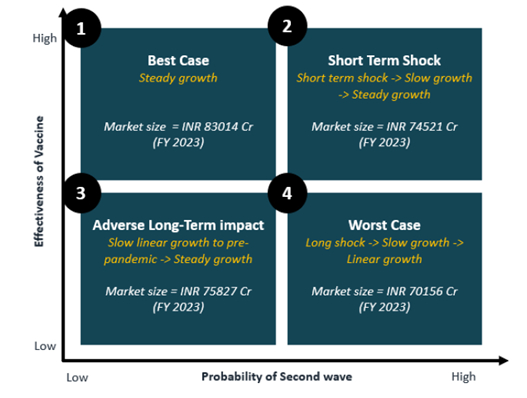I spent most of 2020 researching and writing a book called The Age of Pandemics, 1817-1920: How they shaped India and the World. The book was dedicated to Dr Anil Kumar, IIMA's librarian, who passed away in July 2020 after contracting the coronavirus. Around the time of the book release in November 2020, I began considering whether there would be enough interest among students to take a course exclusively on pandemics, especially because the first COVID-19 wave in India had peaked in September and interest on the subject was rapidly declining.
The key question to consider was what aspect of the pandemic would interest a student in a management school. "Uncertainty" and "Scenario Analysis" seemed to be the operative themes. Since my research interest lies primarily in economics and history, I decided to offer a course that combined both these elements to think through those themes. History offers a unique sample set of past experiences; while history never repeats itself exactly, it often rhymes and thus can potentially broaden the horizons of decision-makers. The economics of the pandemic itself is a vast issue. I had to select few topics among many, trying to minimise overlaps with excellent courses offered by my colleagues in the realms of health economics.
The result was a short 10-session elective called Pandemics!, with five sessions each on history and economics. The sessions on history covered pandemics of the past, especially plague, cholera and the 1918 influenza outbreak. The sessions on economics covered the fiscal and monetary policy responses to the pandemic globally and the impact of the pandemic on financial and labour markets. The last session was devoted to group presentations on providing sectoral outlooks for the next financial year based on different scenarios and assumptions. Students also had to hand in an essay on any economic or business-related theme associated with current or past pandemics. The assigned readings came from various papers and articles across disciplines and some chapters of my book.
I took this course online for 100 PGP-II students in January-February 2021 and more recently for over 90 students in the second iteration in July 2021. I enjoyed the interaction and learnt a lot from their own pandemic-related experiences and submissions. Student essay topics often covered how the pandemic had affected specific firms or even organisational practices, such as placements at IIMA. Some even ventured into interesting aspects of past pandemics using the historical digital databases available in our library. One of the examples is "Advertisements of medicines in India during the 1918 influenza pandemic", using the digitised Times of India database.
The challenges in taking such a course are numerous. Since I am not a scientist, I often had to say "I do not know" on very specific technical questions (it helped to have a medical doctor as a student in one of the sessions!). In fact, one of the things we collectively discovered was how much "we do not know" about the pandemic after seeing the different theories about origins, transmission and impacts. A key point we kept discussing in early 2021 was the level of "herd immunity" in India and the probability of a second wave. I was happy to see at least some group submissions factoring this in their scenario analysis. A sample chart from a group submission is shown below.

A sector-level scenario analysis from a group submission in the Pandemics! elective at IIMA submitted in early February 2021.
A chart like this may seem obvious today after the devastating second wave swept through India in March-May 2021, but this was not the dominant public discourse in January-February 2021. Student groups used very interesting frameworks and assumptions to project revenue growth in different sectors. In fact, many students have now written to me, saying the class on the 1918 influenza pandemic was prescient on what unfolded after the course in Jan-Feb 2021: the rapidity of the second wave and the overwhelming of the public health system.
I began this course with the pitch that it may be the shortest running course at IIMA since the first COVID-19 wave in India was then receding. However, unfortunately (because the pandemic is not yet over), it looks like there will be sufficient take-up for this elective for the next year as well! Since I had the opportunity to interact with leading public health experts and policymakers over the past few months as part of being a member of the independent Lancet COVID-19 Commission India Taskforce, I had the opportunity to invite some of them for short 20 minute Q&A sessions in the July iteration of the course. They include Daksha Shah, a key official in Mumbai's public health response team and Dr. V K Paul, Niti Aayog Member who heads the Government of India's Covid Taskforce. Other guest invitees included Manish Sabharwal, Chariman of the staffing company Teamlease, the biologist Gautam Menon and the journalist Barkha Dutt to engage with queries on the economic, scientific and media related aspects of the pandemic.
There is also some interest in this course at India's premier biology research institute, the National Centre for Biological Sciences (NCBS) in Bengaluru, which hopes to make its own courses more interdisciplinary. You can see the course outline and a list of pandemic-related resources on https://sites.google.com/site/chinmaytumbe/home/pandemics.

About The Author

Prof. Chinmay Tumbe
Chinmay Tumbe (chinmayt@iima.ac.in) is Assistant Professor in the Economics area.